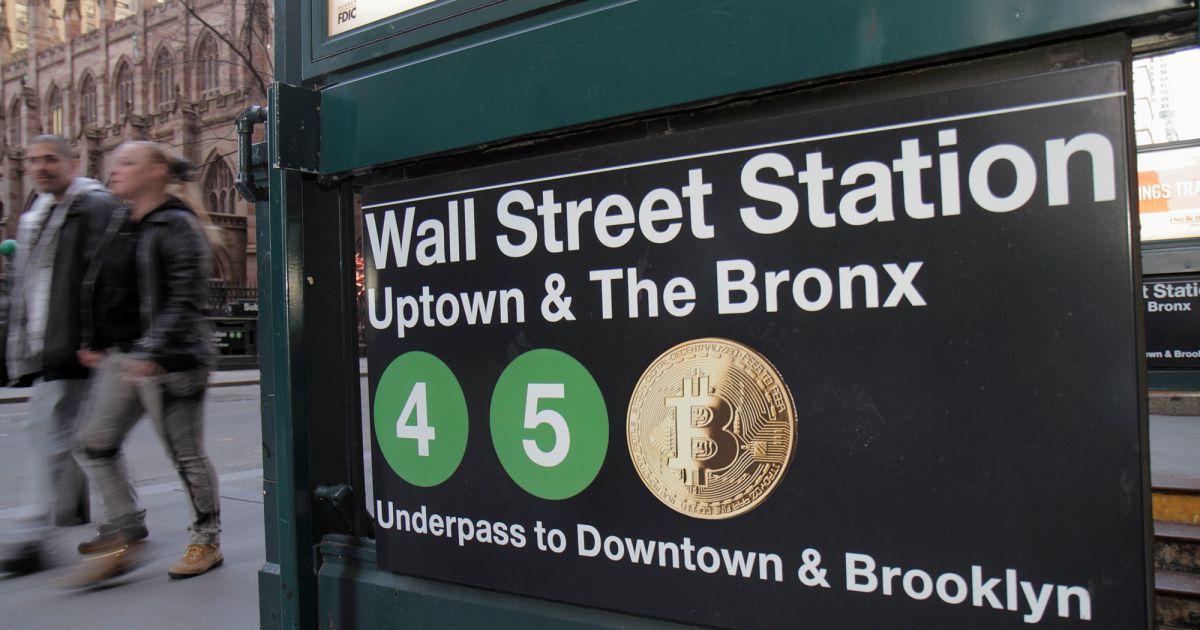Bit by bitcoin, more cryptocurrency firms are establishing themselves in Gotham.
In fact, New York City has begun drawing attention as a potential capital of an industry emboldened by its newest No. 1 fan: native son Donald Trump. Signs of the attraction between industry and municipality are starting to abound.
In April 2024, cryptocurrency exchange Coinbase signed an 11-year lease for two floors totaling more than 67,000 square feet at One Madison Avenue. That same month, crypto trading platform dYdX took three floors, or more than 21,000 square feet, at 38 Greene Street on a 10-year lease.
Crypto finance company Circle Internet Financial relocated from Boston to New York in September, taking the entire 87th floor, equaling over 34,000 square feet, at 1 World Trade Center. And this past April, crypto firm MoonPay took 5,000 square feet for a new headquarters in SoHo.
Gabe Marans, a New York-based vice chairman of Savills, believes there are several reasons crypto is establishing a greater foothold in New York City.
“This is a relatively recent development,” said Marans. “The high-level takeaway is that New York now offers more stability than many international locations that may have previously been viewed as more of a safe haven.”
This is driven in part, Marans said, by the Trump administration’s efforts to ease and simplify regulations on cryptocurrency, including melding certain functions of the federal Securities and Exchange Commission (SEC) and the Commodity Futures Trading Commission (CFTC).
“With the federal government’s efforts to consolidate the SEC and the CFTC, which were both attempting to regulate crypto, the compliance element is now being streamlined. So the U.S. as a whole has become more simplified from a compliance standpoint,” said Marans. “But, even within New York state, the New York State Department of Financial Services’ BitLicense used to be a burden. Now, it’s a filter. It’s essentially become a signal that firms use to show credibility.”
Beyond general ease of function, the industry’s growing presence in New York speaks to the city’s prominent resources within two crucial categories: talent and capital.
“Not only is the talent here, but we’re seeing that most of the VCs who are investing in these companies are based here,” said Brett Harvey, senior managing director at Newmark, which has worked with crypto firms dYdX and Coinbase, blockchain platform Solana, crypto index fund Bitwise, and venture capital firm Andreessen Horowitz, which invests heavily in the crypto and blockchain space. “Access to capital is definitely part of the driver that’s bringing them here.”
Christopher Okada, CEO of the CRE advisory and investment firm Okada & Company, sees a New York City office as a requirement for any company trying to make an impact in crypto.
“Capital, equity and investments are difficult to come across today,” said Okada. “I definitely think there is a requirement to have an office in New York City, even if it’s a small footprint. If you have a 10,000-employee company, you should at least have 5,000 or 10,000 square feet, just for boots on the ground — having access to capital and to people.”
Ben Landy is the founder of the Midtown Manhattan-based Bitcoin Standard Deposits, a platform that allows people to use Bitcoin for security deposits. Landy said that over 100 crypto companies are headquartered in the city, with several congregating in and around the Flatiron District, Chelsea and Midtown West.
While Landy agreed that many crypto companies seek to be New York-based, he makes a clear distinction between corporate and data-mining needs.
“If a company is more of a mining company, then they need a lot more energy, and New York probably wouldn’t be the best city for that because it’s more expensive,” said Landy. “Crypto firms looking into New York City are looking for traditional office space.”
Marans noted that the Flatiron District and Penn South seem to be attracting companies closer to the startup phase, while Midtown and Lower Manhattan host more institutional companies that have close ties to traditional finance, as well as employees — in many cases former Wall Streeters — who commute in from outside of Manhattan.
“For most of them, unless there’s a particular driver for the location, the majority, like most other tech companies, are choosing to be in the Union Square to Madison Square corridor,” said Marans, who cited that last locale as the best place to find the prototypical crypto office.
“Some crypto firms are looking for Class A space. A lot of it depends on who their clientele is and the types of roles they’re looking to hire for,” said Marans. “Others are more startup, pull yourself up by the bootstraps, and are looking for the equivalent of Steve Jobs’s garage for Apple in New York City. So a loft-like, Class B-plus building in the 20s on a mid-block address really covers the entire spectrum of the market.”
Marans also noted that while Miami and Dubai have attracted many of the consumer-facing aspects of the industry, New York has become the home for those with more business-to-business, institutional-grade functions.
“A lot of [those functions] are happening out of sight on what is called the blockchain, at major institutional players within traditional finance, almost all of whom are scaling their crypto infrastructure,” said Marans. “NYU, Columbia, local places of higher education — they’re feeding that talent ecosystem. You’re seeing Wall Street alums that are migrating into decentralized finance, or ‘DeFi,’ trading infrastructure.”
As for crypto office space itself, Marans noted that crypto firms are generally pursuing space on the smaller side, but with potential to expand.
“Most crypto firms start small and scale rather quickly,” said Marans. “Some of them navigate toward coworking solutions if they need to stand themselves right up. But there is a higher-than-average level of concern about data security. So, typically, once they get to a certain scale, there’s a desire for them to have their own space where they can have more control over their cybersecurity.”
Okada agreed that the space demands for crypto offices tend to fall into similar parameters.
“Crypto companies are looking for footprint, and they all want the same things,” said Okada. “Turnkey offices, furnished if possible, fully wired for their servers and technology, and a lot less custom-built. And they want medium- or short-term leases. That’s essentially what we’re seeing from most technology companies: turnkey, furnished, beautiful, ready to go, no headaches.”
Newmark’s Harvey said outdoor space that can be used to host events is another desirable amenity for crypto companies.
“Each one is slightly different, but some recent crypto-company lease signings have focused on new construction buildings in Midtown South. They’ve gobbled up probably 50,000 square feet of new construction over the past 24 months or so,” said Harvey. “Outdoor space is a major driver of that, as these companies seek to host events. Outdoor space enables them to do that on a higher level.”
Harvey also emphasized that when it comes to crypto leases, flexibility for the tenant is key.
“A lot of these companies are young companies, so to get locked into a long-term lease with no growth or termination options doesn’t make sense,” said Harvey. “They need the ability to grow and contract as the years go on.”
From the landlord perspective, while crypto firms are generally well capitalized, Marans noted that it’s still relatively early days for the industry, leaving some level of risk for landlords who accept crypto firms as tenants. (Plus, executives at some firms — including the imprisoned fraudster Sam Bankman-Fried of defunct exchange FTX — have singed the industry with scandal.) But with such risk comes a potential higher level of reward.
“Any industry that is still in the early stages carries risks both upside and downside,” said Marans. “Landlords have varied approaches to crypto in 2025, just as they had varied approaches to emerging technology in 2000. Some landlords are more welcoming than others, and some are benefiting from being more welcoming as many of these companies grow within their buildings. And yet, a large portion of New York’s landlord class is conservative, and tends to prefer more traditional tenants with business models that are more in the mainstream.”
While the San Francisco Bay Area remains the top locale in the U.S. for tech-driven firms, New York, as the country’s financial capital, has quickly become the next most beneficial choice for crypto firms, a trend that promises to grow as regulations shrink away, feeding the industry’s continued expansion.
“I think it’s going to be a long time until New York truly threatens the Bay Area’s crown for crypto and tech,” said Marans. “But New York is a solid second place in terms of blockchain developers, and it’s certainly the No. 1 destination when you’re tying crypto into more of a fintech crossover element. New York, more than the Bay Area, is the world’s capital for financial services, and crypto is getting more closely tied into traditional finance. Because of that, many of them view a New York footprint as critical to that growth.”
Larry Getlen can be reached at lgetlen@commercialobserver.com.


